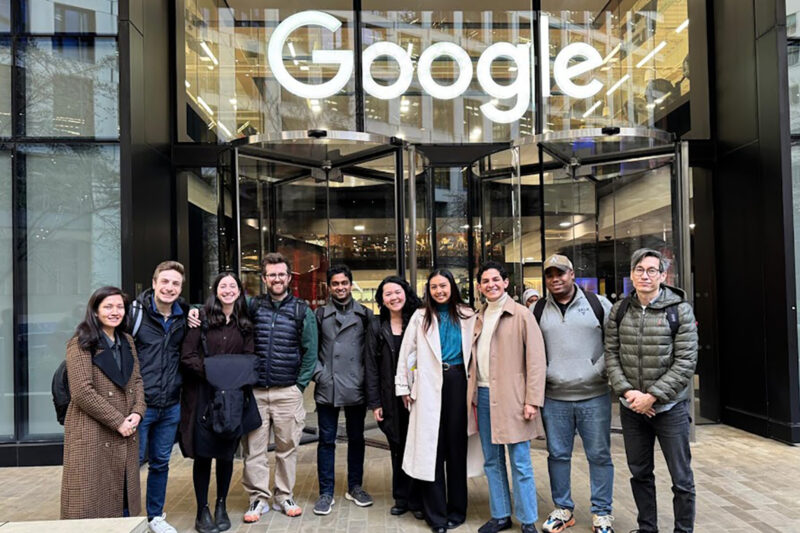During Yale’s recent spring break, 10 students and two Senior Fellows affiliated with the Jackson School’s Schmidt Program on Artificial Intelligence, Emerging Technologies, and National Power traveled to Google DeepMind offices in London. The students participated in a hands-on intensive as part of Jackson’s new spring course sponsored by the Schmidt Program, “Responsible AI in Industry.”
The trip was led by Senior Fellows Sasha Brown and Emily Oehlsen. Brown is the head of Ethics Foresight at Google DeepMind, and Oehlsen — formerly at DeepMind — is the president of Open Philanthropy, a philanthropic advisor and funder. They were joined by Schmidt Program director and Jackson senior lecturer Ted Wittenstein.
“The intensive offered students a unique opportunity to experience the real-world complexities of ethical decision-making under time pressure,” said Brown.
Graduate students from Jackson and Yale’s schools of Management, Environment, and Arts & Sciences took part in a multi-faceted, week-long intensive that included lectures and applied simulation. They met with leaders at Google DeepMind across various functions, studying topics that included ethical AI policies; chemical, biological, radiological, nuclear, and explosives (CBRNE) risks; and mitigation development.
These concepts were then applied to a simulated new model release. In two different teams, they designed and presented original risk assessments, integrating research, AI model evaluations, and “breaking news alerts” — all mirroring real-world scenarios that frontier labs face.
“The course was invaluable because it simulated the internal dynamics of a frontier AI lab, forcing us to make real-time deployment decisions under uncertainty, shifting information, and stakeholder pressure,” said Alejandro Sánchez Flores MPP ’25. “Unlike purely academic settings, we had to weigh national security threats, labor displacement, and commercial incentives simultaneously.”
For Dan Kent MPP ’26, the course was a wholly original experience. “The week definitely earned the title of ‘intensive.’ Working with frontier lab leaders at a place like DeepMind to understand their latest research and forecast how it fits into the bigger picture of AI benefits and risks is an opportunity that few students get to have,” said Kent. “Immediately applying our new knowledge through the simulation on top of that made it a truly rigorous and educational week.”
Miri Aung, a Yale master’s student in international and development economics, called the trip an “unparalleled opportunity” to see firsthand the ethical dilemmas of the AI industry. “As a future government employee, I feel far more equipped to engage in conversations about designing meaningful policy to regulate the AI industry.”
These types of experiences reflect the mission of the Schmidt Program, which brings together scholars and practitioners to work across disciplines on the technological and strategic transformations that are reshaping our world.
“I was impressed by the creativity and thoughtfulness the students brought to the intensive; we were lucky to have such a dedicated group,” said Oehlsen. “I look forward to their future contributions to responsible development and governance of AI technologies.”
